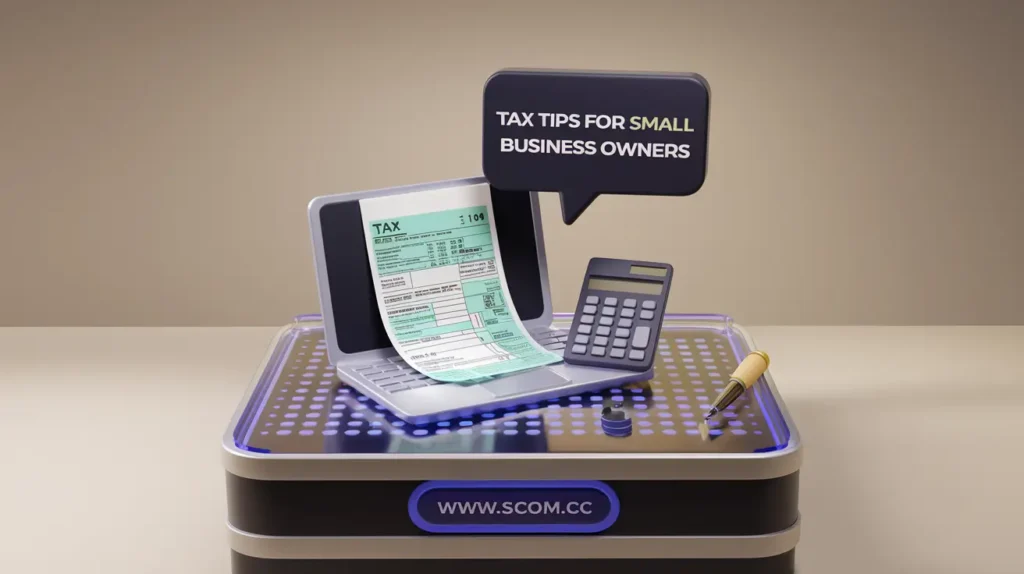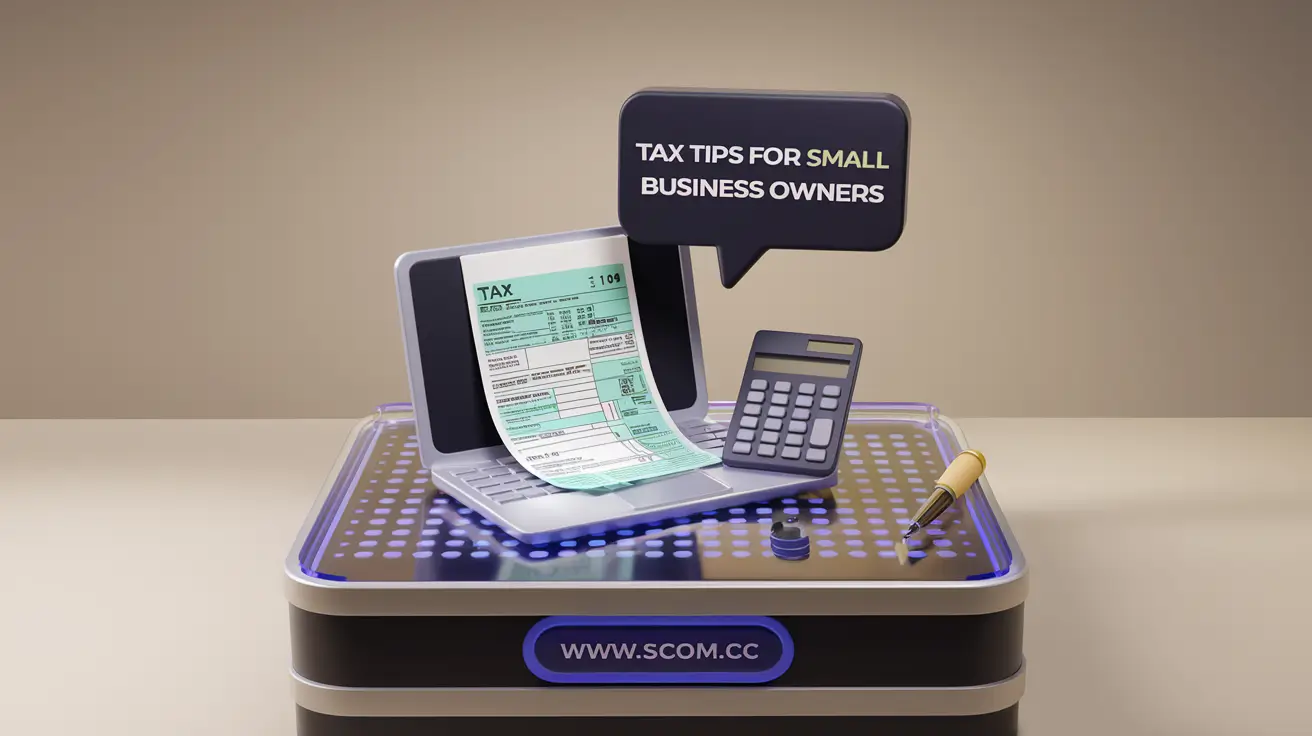Tax Tips for Small Business Owners

- Tax Tips for Small Business Owners
- Understanding Your Tax Obligations
- Keep Accurate Records
- Take Advantage of Deductions and Credits
- Plan for Estimated Taxes
- Understand Tax Filing Requirements
- Keep Abreast of Tax Law Changes
- Keep Good Financial Habits
- Consult a Tax Professional
- Summary Table
-
FAQ
- What are the main tax obligations for small business owners?
- How can I keep accurate financial records for my business?
- What tax deductions can I take advantage of as a small business owner?
- How do I calculate and pay estimated taxes?
- What are the key deadlines for tax filing?
- How can I stay updated on changes in tax laws?
- When should I consult a tax professional?
Tax Tips for Small Business Owners
Managing taxes is a critical aspect of running a small business. Effective tax planning and compliance can help you maximize deductions, minimize liabilities, and ensure you stay on the right side of tax regulations. This guide provides essential tax tips for small business owners to help you navigate the complexities of business taxation efficiently.
Understanding Your Tax Obligations
As a small business owner, you need to be aware of various tax obligations that apply to your business. These include:
- Income Tax: You must report your business income and pay income taxes based on your profits. The tax rate and filing requirements depend on your business structure, such as sole proprietorship, partnership, LLC, or corporation.
- Self-Employment Tax: If you’re self-employed, you’ll need to pay self-employment tax, which covers Social Security and Medicare taxes. This is in addition to your income tax.
- Payroll Taxes: If you have employees, you are responsible for withholding and paying payroll taxes, including Social Security, Medicare, and federal and state unemployment taxes.
- Sales Tax: Depending on your location and the nature of your business, you may be required to collect and remit sales tax on goods and services sold.
- Property Tax: If your business owns real estate or personal property, you may be liable for property taxes.
- Excise Taxes: Certain industries, such as alcohol, tobacco, and fuel, may be subject to excise taxes.
Keep Accurate Records
Maintaining accurate and organized financial records is crucial for tax compliance and maximizing deductions. Here’s how to keep your records in order:
- Track All Income and Expenses: Use accounting software or spreadsheets to record all business transactions. Categorize income and expenses for easy tracking and reporting.
- Save Receipts and Invoices: Keep copies of all receipts and invoices for expenses and income. Digital copies can be stored in cloud-based systems for easy access.
- Maintain Bank Statements: Regularly reconcile your bank statements with your accounting records to ensure accuracy.
- Keep Payroll Records: If you have employees, maintain detailed payroll records, including wages, benefits, and tax withholdings.
- Organize Financial Statements: Prepare and review financial statements, such as profit and loss statements and balance sheets, to monitor your business’s financial health.
- Document Business Assets: Keep records of your business assets, including purchase dates, costs, and depreciation schedules.
Take Advantage of Deductions and Credits
Tax deductions and credits can significantly reduce your tax liability. Familiarize yourself with available deductions and credits to maximize your savings:
- Business Expenses: Deduct ordinary and necessary business expenses, such as rent, utilities, office supplies, and professional services. Ensure these expenses are directly related to your business operations.
- Home Office Deduction: If you operate your business from home, you may qualify for a home office deduction. This includes a portion of your mortgage or rent, utilities, and home maintenance costs.
- Depreciation: Deduct the cost of business assets, such as equipment and vehicles, over their useful life through depreciation. Use Section 179 or bonus depreciation for immediate expensing.
- Travel and Meals: Deduct business-related travel expenses, including transportation, lodging, and meals. Ensure the expenses are directly related to business activities.
- Education and Training: Deduct costs for education and training that improve your skills or those of your employees, as long as they are related to your business.
- Retirement Plan Contributions: Contributions to retirement plans, such as SEP IRAs or 401(k)s, are tax-deductible and can help reduce your taxable income.
Plan for Estimated Taxes
Small business owners may need to make estimated tax payments throughout the year to avoid penalties and interest. Here’s how to plan for and manage estimated taxes:
- Calculate Estimated Taxes: Estimate your quarterly tax payments based on your projected income and deductions. Use IRS Form 1040-ES for guidance.
- Pay Quarterly: Make estimated tax payments on time, typically in April, June, September, and January, to avoid underpayment penalties.
- Adjust Payments as Needed: If your income fluctuates, adjust your estimated tax payments accordingly. Recalculate based on actual income and expenses.
- Keep Track of Payments: Maintain records of all estimated tax payments made, including dates and amounts, for accurate reporting.
- Consult a Tax Professional: Consider consulting a tax professional to ensure accurate estimated tax calculations and payments.
Understand Tax Filing Requirements
Meeting tax filing requirements is essential for compliance and avoiding penalties. Be aware of the following:
- Filing Deadlines: File your business tax returns by the due date to avoid late fees and interest. The deadline depends on your business structure and tax year.
- Form Selection: Choose the correct tax forms based on your business structure. For example, sole proprietors file Schedule C with their personal tax return, while corporations file Form 1120.
- State and Local Taxes: Comply with state and local tax filing requirements, which may include income taxes, sales taxes, and other obligations.
- Extensions: If you need more time to file, request an extension. However, an extension to file is not an extension to pay any taxes owed.
- Electronic Filing: Consider e-filing your tax return for faster processing and confirmation of receipt.
Keep Abreast of Tax Law Changes
Tax laws and regulations frequently change, impacting how small businesses manage their taxes. Stay informed about changes to ensure compliance and take advantage of new opportunities:
- Monitor IRS Updates: Follow IRS announcements and updates regarding tax law changes, deadlines, and new forms.
- Review Tax Legislation: Keep track of federal, state, and local tax legislation that may affect your business.
- Subscribe to Newsletters: Subscribe to newsletters from tax professionals, accounting firms, or business organizations for updates and insights.
- Attend Workshops and Seminars: Participate in tax workshops and seminars to learn about changes and best practices.
- Consult a Tax Advisor: Work with a tax advisor to understand how changes in tax laws impact your business and to receive personalized advice.
Keep Good Financial Habits
Developing and maintaining good financial habits can help streamline tax preparation and ensure long-term financial health. Consider the following habits:
- Budget Regularly: Create and adhere to a budget that accounts for all business expenses and income. Regularly review and adjust as needed.
- Separate Business and Personal Finances: Keep business and personal finances separate by using different bank accounts and credit cards.
- Monitor Cash Flow: Track cash flow to ensure you have sufficient funds to cover expenses and tax obligations.
- Plan for Future Expenses: Set aside funds for future expenses, including taxes, to avoid financial strain.
- Conduct Regular Financial Reviews: Periodically review your financial statements and tax situation to identify potential issues and opportunities for improvement.
Consult a Tax Professional
Navigating tax regulations can be complex, and a tax professional can provide valuable assistance. Here’s how a tax advisor can help:
- Tax Planning: A tax advisor can assist with strategic tax planning to minimize liabilities and maximize deductions.
- Tax Preparation: Professionals can prepare and file your tax returns accurately and on time, reducing the risk of errors and penalties.
- Advice on Tax Issues: Consult a tax advisor for guidance on specific tax issues, such as deductions, credits, and compliance.
- Audit Support: In the event of an audit, a tax professional can provide support and representation to resolve issues.
- Ongoing Guidance: Work with a tax advisor throughout the year for ongoing tax planning and advice.
Summary Table
| Topic | Key Points |
|---|---|
| Understanding Tax Obligations | Income tax, self-employment tax, payroll taxes, sales tax, property tax, and excise taxes. |
| Keep Accurate Records | Track income and expenses, save receipts, maintain bank statements, keep payroll records, and document assets. |
| Take Advantage of Deductions and Credits | Business expenses, home office deduction, depreciation, travel and meals, education and training, retirement plan contributions. |
| Plan for Estimated Taxes | Calculate estimated taxes, pay quarterly, adjust payments as needed, and keep track of payments. |
| Understand Tax Filing Requirements | Meet filing deadlines, choose correct forms, comply with state and local taxes, request extensions, and consider e-filing. |
| Keep Abreast of Tax Law Changes | Monitor IRS updates, review tax legislation, subscribe to newsletters, attend workshops, and consult a tax advisor. |
| Keep Good Financial Habits | Budget regularly, separate business and personal finances, monitor cash flow, plan for future expenses, and conduct financial reviews. |
| Consult a Tax Professional | Seek assistance with tax planning, preparation, advice on issues, audit support, and ongoing guidance. |
FAQ
What are the main tax obligations for small business owners?
Small business owners must manage income tax, self-employment tax, payroll taxes, sales tax, property tax, and possibly excise taxes. Understanding these obligations is crucial for compliance.
How can I keep accurate financial records for my business?
Track all income and expenses, save receipts and invoices, maintain bank statements, keep payroll records, organize financial statements, and document business assets. Use accounting software for better organization.
What tax deductions can I take advantage of as a small business owner?
Common deductions include business expenses, home office deductions, depreciation, travel and meals, education and training costs, and retirement plan contributions.
How do I calculate and pay estimated taxes?
Calculate estimated taxes based on projected income and deductions using IRS Form 1040-ES. Make quarterly payments to avoid penalties, and adjust payments as needed based on actual income.
What are the key deadlines for tax filing?
File business tax returns by the due date, which varies based on your business structure. Check for specific deadlines and consider requesting extensions if needed.
How can I stay updated on changes in tax laws?
Monitor IRS updates, review tax legislation, subscribe to newsletters, attend workshops and seminars, and consult with a tax advisor to stay informed about changes that may impact your business.
When should I consult a tax professional?
Consult a tax professional for tax planning, preparation, advice on specific issues, audit support, and ongoing guidance throughout the year. They can help ensure accurate filing and compliance.

If you enjoyed this article and found it valuable, we encourage you to explore our news and valuable information section, where you'll find more relevant and up-to-date content that may pique your interest. Additionally, if you are seeking advice or need guidance on a specific topic, we suggest visiting our services section. There, you will find a variety of options designed to assist and support you in addressing your needs. Feel free to check out both sections to get the information and assistance that best suits your requirements.

Leave a Reply